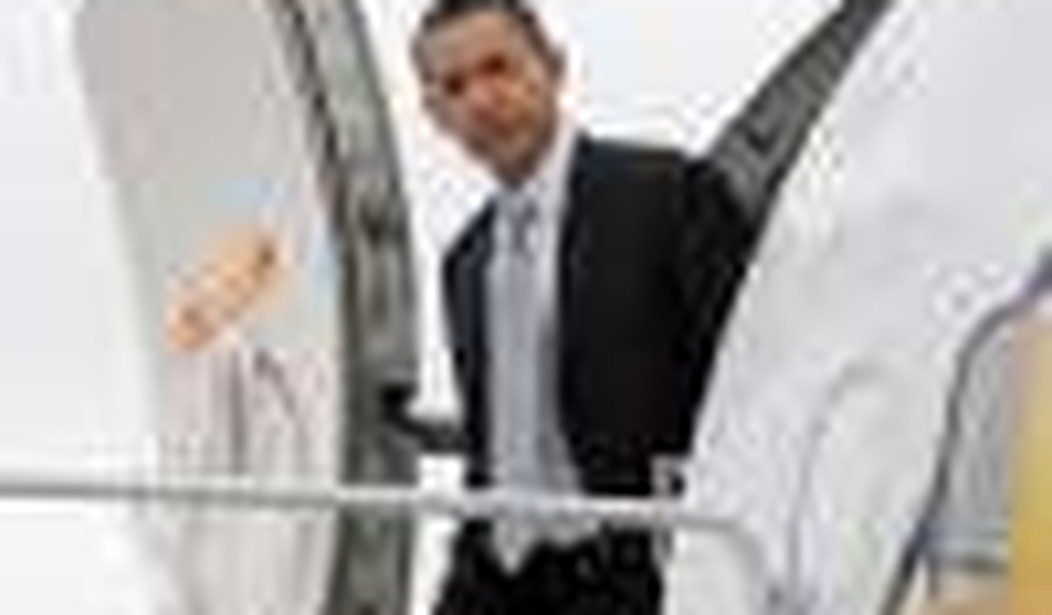In an act of stark political cowardice, Democratic presidential candidate Barack Obama, who has staked his bid for the White House on an unconditional withdrawal from Iraq, has publicly refused to visit the nation and take a firsthand look at the radical transformation that has occurred since he first pledged headlong retreat.
On Monday, Republican presidential candidate John McCain criticized Obama for failing to visit Iraq since his brief two-day stopover in 2006, and challenged Obama to come to Iraq with him on a joint fact-finding mission. Obama campaign spokesman Bill Burton dismissed the joint visit out of hand:
John McCain’s proposal is nothing more than a political stunt, and we don’t need any more “Mission Accomplished” banners or walks through Baghdad markets to know that Iraq’s leaders have not made the political progress that was the stated purpose of the surge. The American people don’t want any more false promises of progress; they deserve a real debate about a war that has overstretched our military, and cost us thousands of lives and hundreds of billions of dollars without making us safer.
Burton suggests that while Obama is willing to meet rogue terrorist-sponsoring regimes without preconditions, he will not meet with America’s allies or American soldiers to talk of current developments. Instead he will doggedly stick to a defeatist stance hardened years ago, and immune to change.
McCain reiterated the challenge on Wednesday, and Obama’s campaign once again refused McCain’s invitation for a joint trip. Obama is now said to be considering a stopover in Iraq as part of a foreign swing, though his aides seemed unsure that such a trip would take place, bringing about speculation that talk of a trip is merely posturing by Obama strategists.
The politics at play here show a significant shift in how Democrats and Republicans are discussing the war in Iraq as part of the 2008 election.
During the 2006 mid-term elections, Democrats hammered Republicans for an Iraq that seemed to be rapidly collapsing into a sectarian civil war between Sunni and Shia. Internal U.S. military documents were doubtful of success in Iraq’s massive western province of al-Anbar. The Iraq Study Group declared that the situation was deteriorating and that there was no foreseeable end to the conflict. Hammering Republicans for their support of a failing war seemed to be a workable campaign strategy for 2008.
February 2007, General David Petraeus was selected commander of Multi-National Force – Iraq (MNF-I) to implement the “surge” of U.S. forces into Iraq in an effort to end sectarian violence and impose order. During that time period, freshman Senator Barack Obama formally declared his presidential candidacy, stipulating that ending the war in Iraq was a key priority of his campaign.
In the 15 months since Obama declared that a cornerstone of his candidacy was withdrawing from the war as rapidly as possible, the Illinois senator has resolutely stuck by publicly-stated plans to retreat American forces, even as the war has evolved beyond his calcified position.
The “surge” strategy and counterinsurgency (COIN) doctrine implemented by American forces in 2007-2008, along with tectonic shifts in Iraqi internal dynamics, has largely resulted in the end of the sectarian civil war.
An uprising among Sunnis in al-Anbar known as the “Awakening” movement saw tribal militias enter into direct combat with al-Qaeda-aligned insurgent groups and reach out to coalition forces. The Awakening movement spread across Iraq, and al-Qaeda and aligned insurgent groups have fragmented. Fallujah, a hotbed of the insurgency and the scene of intense urban combat in 2004, is now a city under reconstruction and patrolled by fewer than 250 Marines. Even al-Qaeda leaders agree that the terrorist group and other allied fragments of the Sunni insurgency are all but defeated in Iraq. The demise of al-Qaeda also weakened the legitimacy of Shia militias, most of which were and are little more than territorial gangs.
Iraqi Prime Minister Nouri al-Maliki has emerged as a leader capable of building a political coalition across sectarian divides even as he solidifies the power of the central government, and has quashed renegade Shiite militias throughout southern Iraq and Baghdad’s Sadr City slums, while subtly warning Iran that their support and supply of anti-government forces in Iraq is known, unwelcome, and well-documented, which could be embarrassing if revealed in the form of hard evidence in front of the United Nations.
Iraq is not close to being the country it was just two years ago, one that then threatened to tear itself apart as insurgent groups, terrorists, and criminal gangs ruled through fear. It is now a nation where the central government is creating its own legitimacy among the Iraqi people, and where hope has returned. The cascade of positive developments in Iraq has dashed Democratic hopes of using the security situation in that country as a legitimate issue in 2008, and instead, it is Republican presidential candidate John McCain using Iraq’s successes to argue that Democrats rallying for defeat are out of touch with Iraq’s new reality.
Hope for Iraq has been formally abandoned by Senate Majority Leader Harry Reid, Speaker of the House Nancy Pelosi, DNC Chairman Howard Dean, and much of the rest of the Democratic Party. They aligned themselves with defeatism behind Barack Obama, a man who paradoxically built his appeal on empty platitudes and promises of withdrawing from a failed Iraqi state.
Iraq has changed considerably, and while not pacified, it is certainly moving rapidly towards stability. The Iraqi people have left Barack Obama to bitterly cling to an Iraq that no longer exists, as a candidate unable to accept change or provide hope.









Join the conversation as a VIP Member